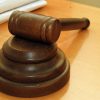Some of the First Fleet — 11 British Navy ships under the command of Captain Arthur Phillip, which took 750 British convicts to Botany Bay, where they established the first European settlement in Australia, 1788
Credit: Hulton Archive
The ships struggled to leave the bay: the Lady Penrhyn almost ran aground, the Charlotte and the Friendship collided, and the Friendship and the Prince of Wales lost booms and sails after colliding.
The ships finally reached Sydney Cove on January 26 and formally established the Colony of New South Wales on February 7.
By 1808, convicts who had been pardoned — known as emancipated convicts — were celebrating the anniversary of their arrival with dinner, drinking and toasts.
The first official celebration took place in 1818 on the 30th anniversary of their arrival, with Governor Lachlan Macquarie naming the day a national holiday, called Foundation Day. While Australians celebrated the day every year for the following centuries, it wasn’t until 1994 that all territories and states celebrated the public holiday on the same day for the first time.
The backlash against the holiday
For indigenous Australians, Australia Day marks the start of white colonisation and persecution, including dozens of massacres throughout the 19th and early 20th centuries.
In 1938, a Day of Mourning was held by Aboriginal Australians in protest against the holiday, 150 years after the British first landed on Sydney Cove, New South Wales.
Fifty years earlier, Aboriginal leaders had boycotted celebrations; however on the sesquicentenary they decided they needed to do more to attract the attention of the media.
Prime Minister Joseph Lyons, met with the leaders on January 25, before the protesters marched through Sydney on the anniversary itself. Since then, protests have been held almost every year on Australia Day, with some events going under the name Invasion Day and Survival Day.
Last year was no different, with thousands of indigenous Australians taking to the streets to protest against the celebration.
A group of Aboriginals stand in front of a mock coffin with 'Colonisation' written on it on Australia Day
Credit: Anadolu Agency
There are nearly 800,000 Aborigines in a population of 25 million in Australia, whose descendants date back about 50,000 years before British colonisers arrived. They suffer disproportionately high rates of suicide, alcohol abuse, domestic violence and imprisonment.
Protesters have demanded a treaty between indigenous and non-indigenous Australians, recognition in the constitution, and an end to inequality. They also want the date of Australia Day to be changed, or abolished altogether.
Whether to change the date of Australia Day has been a subject of debate for many years, as has whether to change the Australian flag, which includes the British Union Jack.
The former Prime Minister Malcolm Turnbull ruled out a change of flag. "That’s the one they have on their backpacks when they’re travelling overseas, that’s the flag that our soldiers have on their shoulder patches, that is our flag,” he told reporters.
How did Australia get its name?
From the 2nd century, Europeans referred to the vast expanse of land in the southern hemisphere as the ‘unknown southern land’ — or, in Latin, ‘terra australis incognita’.
In 1644, the Dutch explorer Abel Tasman used the name ‘New Holland’ to refer to the land. Although the Dutch made expeditions to the land many times over the following centuries, they never claimed any territory there, assuming that the lack of fertile soil would make it impossible to colonise.
When British explorer James Cook claimed Australia’s east coast in 1770, he originally named it New Wales, before renaming it New South Wales.
James Cook, who claimed Australian land in 1780
Credit: Time Life Pictures/Mansell/Time Life Pictures/Getty Images
It was Matthew Flinders, the British navigator who officially identified Australia as a continent, who suggested a return to the Latin name. In 1804, he referred to the land as Australia in a chart he created while held captive by the French in Mauritius.
However the name was met with disapproval back home. On his return to England, he published a book on his travels in 1814; the book was even renamed ‘A Voyage to Terra Australis’ without his consent. In it, he discussed his reasons for the name:
‘There is no probability, that any other detached body of land, of nearly equal extent, will ever be found in a more southern latitude; the name Terra Australis will, therefore, remain descriptive of the geographical importance of this country, and of its situation on the globe.
‘…Had I permitted myself any innovation upon the original term, it would have been to convert it into Australia; as being more agreeable to the ear, and an assimilation to the names of the other great portions of the earth.’
Flinders died in July 1814, and was buried at St James’s Gardens, London. Ten years after his death, the name was officially accepted by the British Admiralty in 1824.
Some believed the explorer’s grave was lost underneath a platform at London Euston, but in January 2019, archaeologists carrying out a mass excavation of graves to make way for the arrival of HS2 found his remains, with his name clearly engraved on the lead plate of his coffin.
The archaeologists identified the remains of Flinders by the lead plate placed on top of his coffin
Credit: James O. Jenkins/HS2
Australian of the Year
Since 1960, a citizen of Australia has been named Australian of the Year each year by the National Australia Day Council. Each year the winner is announced on January 25; this year, Grace Tame won the award for helping to change Tasmanian law to give sexual assault survivors a voice; in 2020, eye surgeon Dr James Muecke, won the award for his work helping to prevent blindness.
In 2016, former Lieutenant-General David Morrison was named as Australian of the Year, who is widely known for ordering army troops to accept women as equals in a viral video.
He caused controversy in his acceptance speech by wading into the debate on the monarchy, saying "I will lend my voice to the republican movement in this country. It is time, I think, to at least revisit the question so we can stand both free and fully independent amongst the community of nations."





















































Свежие комментарии